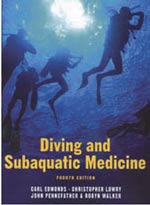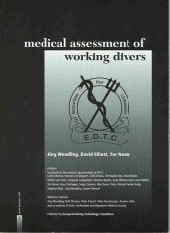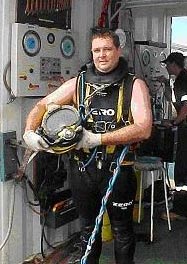The BScMedScHons (Underwater Medicine) degree programme
Module 1: Basic Underwater Medicine
Brief description:
- First of four modules in the underwater medicine degree programme
- Theoretical training provided via the internet - web-based guidance
through the text book and other downloadable documents.
- Contact time of four days
- Practical training in the techniques of examining divers.
Training outcomes:
The exit outcome for this module is equivalent to the European Diving
Technology Committee (EDTC) level 1, which is a medical examiner of
divers. In brief: training a medical practitioner to practice diving
medicine within his or her medical practice.
Successful candidates may be able to register with the South African
Department of Labour as a Designated Medical Practitioner (an examiner of South
African commercial divers).
Theoretical training:
T extbook: "Diving and Subaquatic Medicine" - 4th edition - by Carl Edmonds, Christopher Lowry, John Pennefather & Robyn Walker.
extbook: "Diving and Subaquatic Medicine" - 4th edition - by Carl Edmonds, Christopher Lowry, John Pennefather & Robyn Walker.
ISBN: 0-340-80630-3 (hard back); 0-340-80629-X (soft cover)
This book is available for purchase from many online dealers, e.g. Best Publishing or Amazon. South African students may order this book from DAN Southern Africa and delivery takes about two working days (if in stock).
The students are guided through the textbook by means of prescribed readings of certain chapters in the textbook and additional downloads where certain themes are not covered adequately in the textbook. This can be done at any time and place the student prefers, as well as at a pace that is comfortable. You can test your knowledge by completing online self-tests (with specific guidance in the case of incorrect answers) and after a theme is mastered, you can write the summative assessment for that specific theme (each summative assessment ranges between 5 minutes and 20 minutes).
 Textbook: "Medical assessment of working divers" 1st edition - by Jürg Wendling, David Elliott & Tor Nome ISBN: 3-9522284-2-7 This textbook presents medical conditions as a one-page document with specific considerations regarding fitness-to-dive criteria. This book is also available from the Divers Alert Network Southern Africa and can be directly ordered via the IMCA website http://www.imca-int.com/divisions/diving/publications/edtc.html
Textbook: "Medical assessment of working divers" 1st edition - by Jürg Wendling, David Elliott & Tor Nome ISBN: 3-9522284-2-7 This textbook presents medical conditions as a one-page document with specific considerations regarding fitness-to-dive criteria. This book is also available from the Divers Alert Network Southern Africa and can be directly ordered via the IMCA website http://www.imca-int.com/divisions/diving/publications/edtc.html
Practical training:
The practical training concentrates on the physical examination of divers, thus looking in more details at physical examination skills and special investigations like the lung function tests, stress ECG tests, audiogram interpretation, etc.
Another part of the practical experience is the observation of a properly run commercial diving operation. This presentation is usually done by the South African Navy Diving Centre. They also demonstrate various pieces of diving equipment and explains their functioning.
There is no in-water diving, nor hyperbaric chamber dives during this module.
Entry requirements:
Each prospective candidate must:
- have the MBChB degree or any other equivalent degree that enables him or her
to register as a medical practitioner.
- be registered with the Health Professions Council of South Africa, or an
equivalent international professional body that registers medical practitioners
(e.g. GMC in the UK)
- have completed his/ her internship year(s).
- have access to the internet or the ability to gain access
- be able to browse the internet training site
The following are NOT requirements:
- Being a diver (recreational or commercial)
- Being medically fit to dive.
Observers:
Persons who do not meet the requirements for entry into the module may in specific circumstances be allowed to participate in the module as an observer. These circumstances are:
- Should have a medically-related qualification (e.g. nursing care or emergency care)
- Must be actively involved in diving medical practice with a medical practitioner (e.g. helping with side-room investigations or chamber treatments)
- Must have a referral letter from a diving medical practitioner (including motivation for attendance)
- Subject to an interview with the programme coordinator.
Note 1: Observers may NOT receive ANY certification when attending the module. The person attends the module purely for personal enrichment. Certificates of attendance are NOT issued!
Note 2: Observers are by definition not medical practitioners. This module trains medical practitioners to apply knowledge they already have (e.g. ability to read ECG's, ability to read X-rays, ability to interpret audiograms, etc.). Students who do not at least have a basic knowledge of these will either waste their own time because they don't understand what is said in class, or they would want to ask a lot of questions in class, which will waste the time of the attendees.
Examination:
The examination of this module is done in various stages. The first stage is done via WebCT (summative assessments). On the last day of the contact session, the students will also write a theoretical examination. This consists of approximately six diving fitness evaluation exercises (on paper) with related theoretical questions.
Students enrolled for the degree programme will write an examination at the end of their study period, to test their ability to integrate knowledge across all of the modules.
Certification:
Students who successfully complete the module, will receive:
- Certificate of competency from the Stellenbosch University
- Duplicate certificate of competency for submission to the Department of Labour (for South African candidates)
- Certificate of competency from the European College of Baromedicine.
- CPD/ CME certificate from the Stellenbosch University
Accreditation:
This module is accredited with:
- The South African Department of Labour
- The Diving Medical Advisory Committee (DMAC)
- The European College of Baromedicine (ECB)
- The European Diving Technology Committee (EDTC)
- The European College for Hyperbaric Medicine. (ECHM)
- The Stellenbosch University for CPD points.
Recognition of Prior Learning (RPL):
RPL is provided to any candidate who had previously done a course or training programme in diving medicine. The Stellenbosch University has specific policies and procedures relating to RPL of a student. Contact the programme coordinator for more information.
Contact details:
For more information, please contact Dr. W.A.J. (Jack) Meintjes, the programme coordinator:
 Att: Dr WAJ (JACK) MEINTJES
Att: Dr WAJ (JACK) MEINTJES
Department of Interdisciplinary Health Sciences
Community Health
PO Box 241
CAPE TOWN
8000
South Africa
Tel: +27 21 938-9272
email: wajm@sun.ac.za

